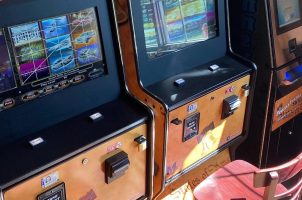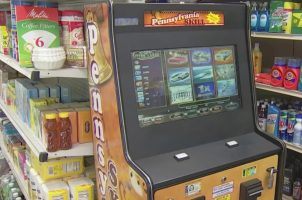Pace-O-Matic Can’t Get Kansas Courts to Say ‘Dragon’s Ascent’ is Legit
Posted on: January 6, 2025, 06:12h.
Last updated on: January 7, 2025, 09:22h.
Gaming machine manufacturer Pace-O-Matic’s efforts to have its dragon-shooting game “Dragon’s Ascent” declared a contest of skill by the Kansas Supreme Court has been shot down in flames.

Dragon’s Ascent, currently widely available in Kansas truck stops and convenience stores, resembles the popular fish-shooting-style games that originated in Asia, but replaces fish with dragons. Every shot fired costs a credit, or stake, while every dragon slain yields a prize.
Kansas law defines gambling, in part, as a bargain “dependent on chance,” and exempts contests “for the determination of skill, speed, strength or endurance,” which is why the skill factor in Dragon’s Ascent is such a big deal for Pace-O-Matic.
The Georgia-based company claims on its website that Dragon’s Ascent is “100% skill and strategy,” which would mean it’s not an illegal gambling device under state law.
The trouble is, Pace-O-Matic is having a hard time getting anyone from the executive or judicial branches of state government to definitively agree.
No Straight Answer
The company first turned to the Kansas Racing and Gaming Commission (KRGC) in 2019, but its conclusion was disappointing. The commission determined that while the game certainly contained elements of skill, there were “many non-skill features.”
For instance, it observed a player beating opponents by placing a heavy can over the joypad to enable continuous firing.
Ultimately, the commission said it couldn’t make a formal decision because the dynamics of the game could be altered remotely. The Attorney General’s Office also refused to weigh in when its opinion was sought.
So, Pace-O-Matic turned to the courts, filing a lawsuit seeking a declaration that the machines were legal. The suit also argued Kansas laws were too vague in their description of an illegal gambling device.
The lower court said there was no case to answer because Pace-O-Matic was operating the game without harassment from law enforcement and therefore hadn’t been financially harmed.
Meanwhile, several Kansas casino operators sued the company, arguing that Dragon’s Ascent is indeed illegal, and that they had been financially harmed by Pace-O-Matic. That case is pending.
Lacks Standing
Last week, the Supreme Court justices upheld the lower court’s decision that the case lacked standing.
Dragon’s Ascent has operated throughout Kansas for several years without incident. No devices have been seized. No prosecutions have been initiated. No cease-and-desist orders have been issued. And neither the Racing and Gaming Commission nor the Attorney General has opined that the game is illegal,” wrote Justice Keynen Wall.
Pace-O-Matic is taking that ruling as a win.
“[…]Based on these facts and this case, we will continue to operate legally in Kansas,” Michael Barley, chief public affairs officer at Pace-O-Matic, told The Topeka Capital-Journal.
Related News Articles
Parx Casino Sues Pennsylvania Skill Gaming Company, Alleges Machines Illegal
Pennsylvania Skill Gaming Manufacturer Secures Legal Victory
Most Popular
PUCK, NO! Health Dept. Closes Las Vegas Wolfgang Puck Restaurant
Oakland A’s Prez Resigns, Raising Questions About Las Vegas Move
MGM Osaka to Begin Construction on Main Resort Structure in April 2025
Most Commented
-
UPDATE: Whiskey Pete’s Casino Near Las Vegas Closes
— December 20, 2024 — 33 Comments -
Zillow: Town Outside Las Vegas Named the Most Popular Retirement City in 2024
— December 26, 2024 — 32 Comments -
Caesars Virginia in Danville Now Accepting Hotel Room Reservations
— November 27, 2024 — 9 Comments -
Oakland A’s Prez Resigns, Raising Questions About Las Vegas Move
— December 27, 2024 — 9 Comments
















No comments yet